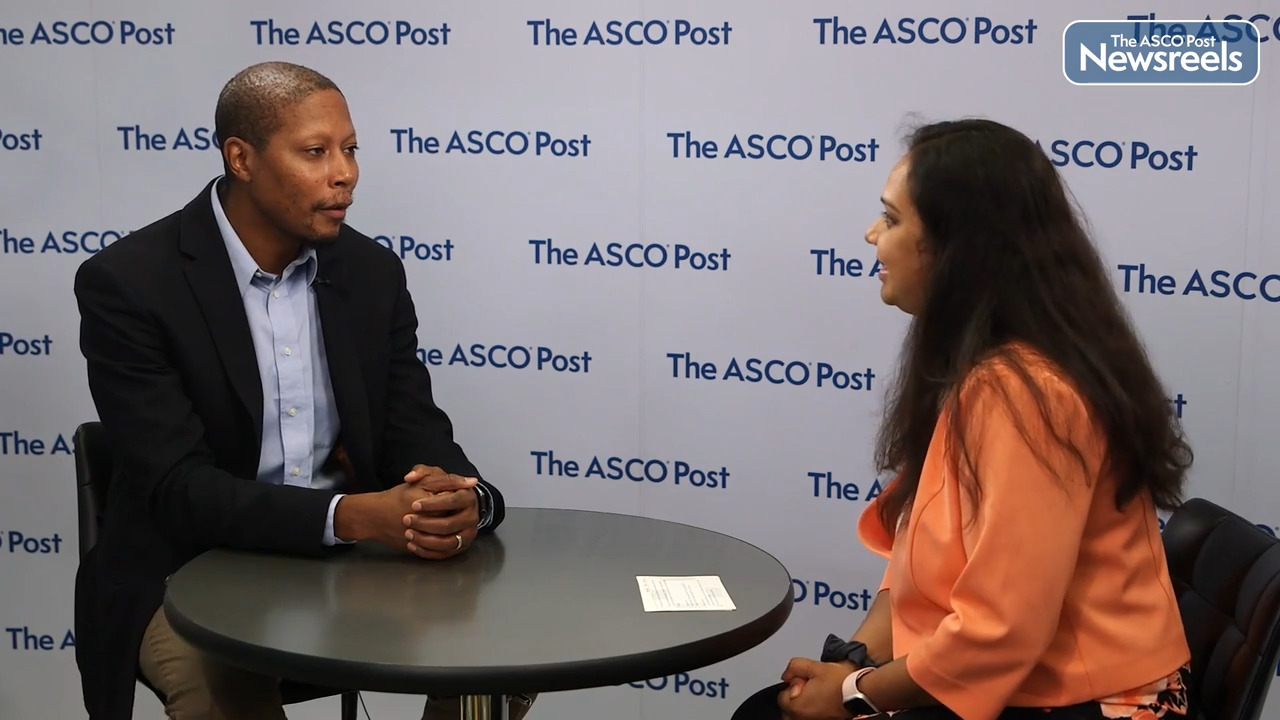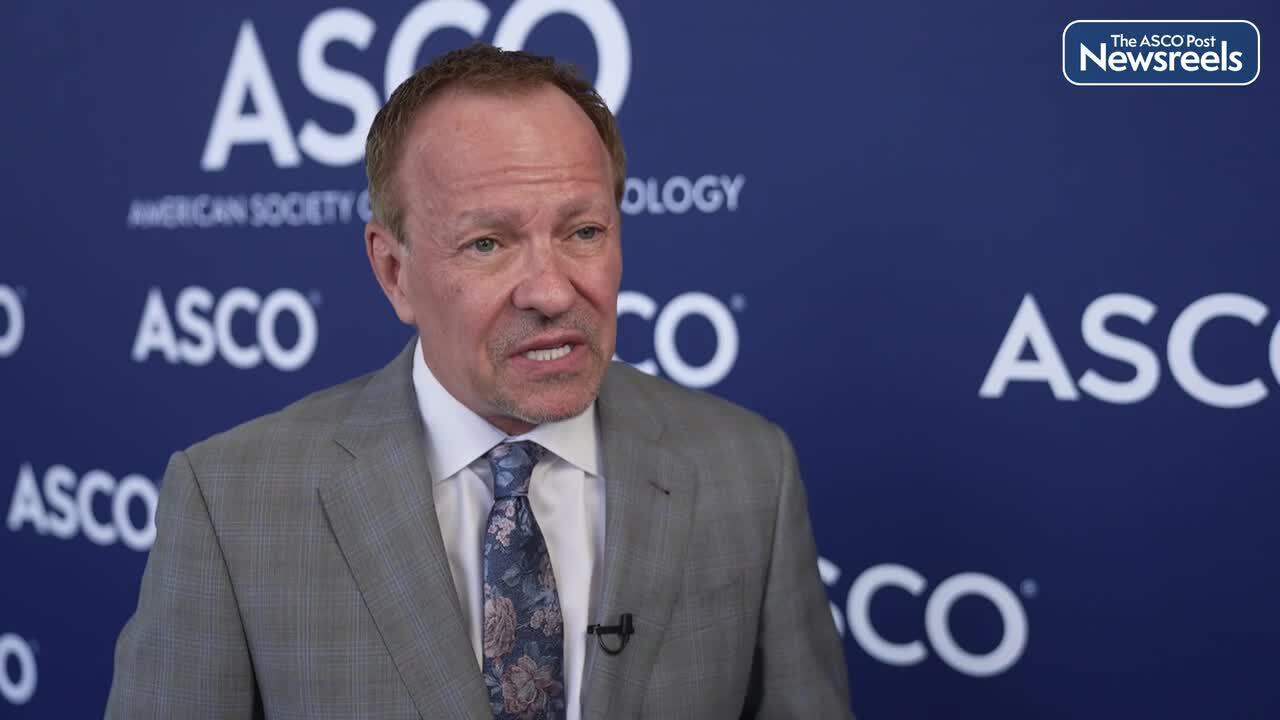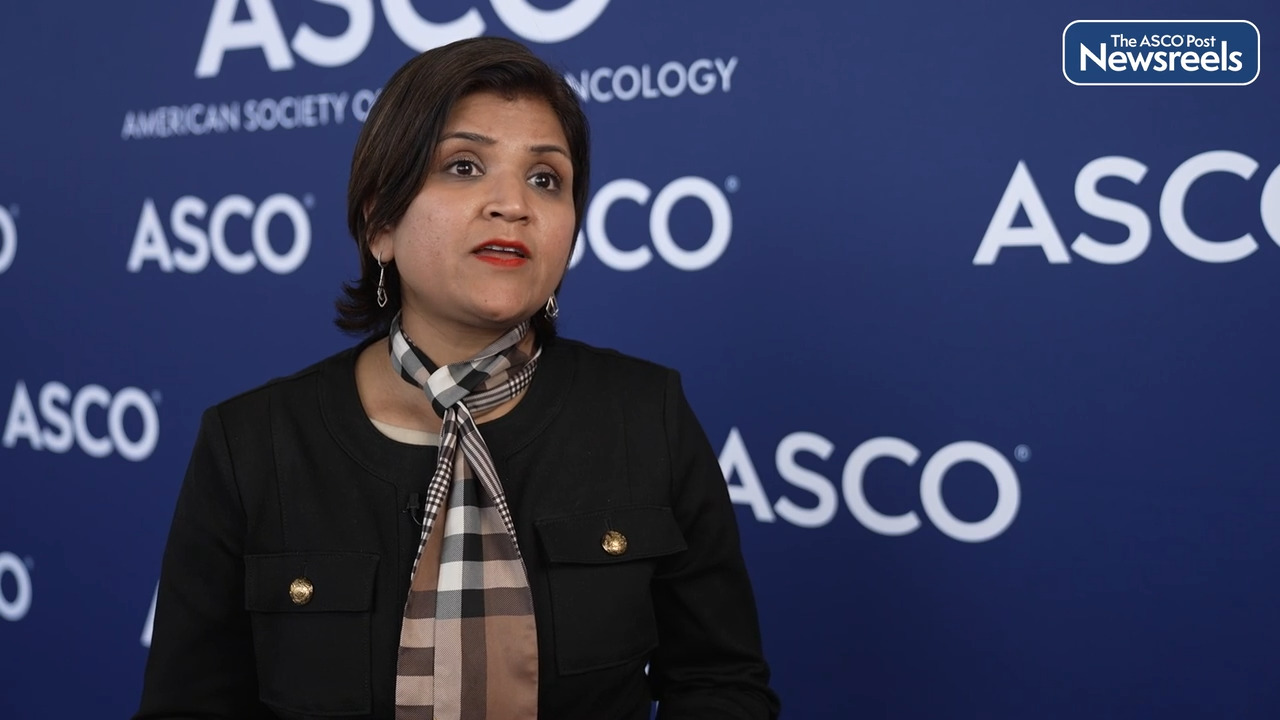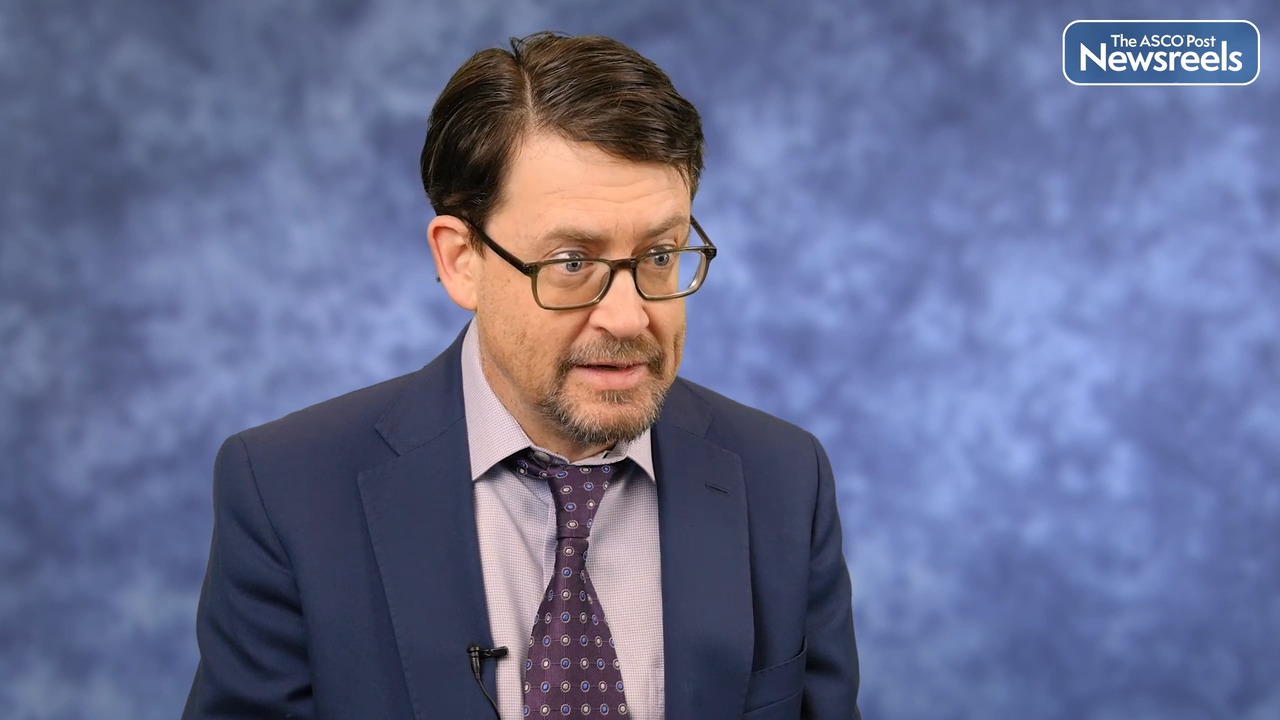Tycel J. Phillips, MD, and Swetha Kambhampati, MD, on Mantle Cell Lymphoma: Real-World Outcomes With Brexucabtagene Autoleucel
Tycel J. Phillips, MD, and Swetha Kambhampati, MD, both of City of Hope National Medical Center, discuss new findings showing that the real-world effectiveness and safety of brexucabtagene autoleucel were similar to data from the pivotal ZUMA-2 trial in patients with relapsed or refractory mantle cell lymphoma, regardless of prior BTK inhibition, bendamustine, or autologous stem cell transplantation (Abstract 7507).
Bradley J. Monk, MD, on Cervical Cancer: Findings on Pembrolizumab Plus Chemotherapy
Bradley J. Monk, MD, of the University of Arizona, Phoenix, and Creighton University, discusses phase III findings from the KEYNOTE-826 study of overall survival results in patients with persistent, recurrent, or metastatic cervical cancer. Study participants received first-line treatment of pembrolizumab plus chemotherapy, with or without bevacizumab, which reduced the risk of death by up to 40% in three different subsets of patients (Abstract 5500).
Shilpa Gupta, MD, on Urothelial Carcinoma: Long-Term Outcome of Enfortumab Vedotin Plus Pembrolizumab
Shilpa Gupta, MD, of Cleveland Clinic, discusses the results from the EV-103 study and the unmet need for effective first-line therapies in cisplatin-ineligible patients with locally advanced or metastatic urothelial carcinoma. After nearly 4 years of follow-up, the trial findings showed that enfortumab vedotin-ejfv plus pembrolizumab continues to demonstrate promising survival trends with rapid and durable responses in this population (Abstract 4505).
Mirvetuximab Soravtansine Improves Survival in Patients With Recurrent Ovarian Cancer
The international phase III MIRASOL randomized clinical trial found that mirvetuximab soravtansine-gynx, an antibody and microtubule inhibitor conjugate, significantly improved progression-free and overall survival for patients with platinum-resistant, advanced high-grade epithelial ovarian,...
Nivolumab May Reduce Risk of Disease Progression or Death in Previously Untreated Patients With Hodgkin Lymphoma Compared to Brentuximab Vedotin
The immune checkpoint inhibitor nivolumab plus chemotherapy significantly reduced the risk of disease progression and disease-related death compared with standard treatment with the CD30-targeted drug brentuximab vedotin plus chemotherapy in pediatric and adult patients with previously untreated...
Changes in RECIST Tumor Measures Correlate Linearly With Survival in Patients Treated With Checkpoint Inhibitors
The Response Evaluation Criteria in Solid Tumors (RECIST), used in many clinical trials to evaluate changes in tumor burden over time, classify objective tumor response into one of four categories—complete response, partial response, stable disease, or progressive disease—based on the percent of...
Is Pembrolizumab Effective in Patients With Brain Metastases?
In a phase II clinical trial, investigators found that 42% of patients with brain metastases benefited from treatment with the immune checkpoint inhibitor pembrolizumab, with 7 of the 57 patients in the trial surviving for longer than 2 years. The study authors cautioned that these benefits must be ...
New Bladder Cancer Classification May Predict Response to BCG Immunotherapy in Patients With Non–Muscle-Invasive Bladder Cancer
Researchers have developed a new strategy to identify which patients with non–muscle-invasive bladder cancer may be most likely to resist first-line treatment with Bacillus Calmette-Guérin (BCG) immunotherapy, according to a new study published by Jong et al in Science Translational Medicine. The...
Adding Pembrolizumab to Chemotherapy May Improve Survival in Patients With Advanced Cervical Cancer
Adding the PD-1 inhibitor pembrolizumab to chemotherapy, with or without bevacizumab, improved overall survival and progression-free survival in patients with persistent, recurrent, or metastatic cervical cancer, regardless of whether the cancer expressed PD-L1. These findings from the KEYNOTE-826...
Highlighting Progress in Myeloma Treatment: POLLUX Trial Final Overall Survival Results With Daratumumab-Based Therapy
The updated results of the POLLUX trial, reported in the Journal of Clinical Oncology by Dimopoulos and colleagues and in this issue of The ASCO Post, showed significantly improved overall survival with daratumumab plus lenalidomide/dexamethasone (DRd) vs Rd in patients with previously treated...
Anti–PD-L1 Combination vs Sunitinib in Metastatic Renal Cell Carcinoma
In a meta-analysis reported in a research letter in JAMA Network Open, Maiorano et al found that first-line anti–PD-L1 treatment combinations did not significantly improve overall survival vs sunitinib in patients with metastatic renal cell carcinoma. A progression-free survival benefit was...
Interleukin-21 Identified as Potential New Therapeutic Target to Prevent Endocrine Autoimmune Adverse Effects From Cancer Immunotherapy
Researchers have discovered that interleukin-21 may be a potential therapeutic target to help reduce the endocrine autoimmune adverse effects and prevent the thyroid autoimmunity experienced by patients with cancer undergoing treatment with immune checkpoint inhibitors, according to a novel study...
Tumor Mutational Burden and Outcomes in Patients With Advanced Cancers Treated With Immune Checkpoint Inhibitors
In a study reported in JAMA Network Open, Charu Aggarwal, MD, MPH, and colleagues found that patients with advanced solid cancers and a high tumor mutational burden (TMB-H) had improved overall survival with immune checkpoint inhibitor therapy vs those with a low tumor mutational burden (TMB-L)....
Addition of Panitumumab to Trifluridine/Tipiracil in Anti-EGFR Treatment Rechallenge in Refractory RAS Wild-Type Metastatic Colorectal Cancer
In the Italian phase II VELO trial reported in JAMA Oncology, Napolitano et al found that anti-EGFR treatment rechallenge with the addition of panitumumab to trifluridine/tipiracil improved progression-free survival in the third-line setting for patients with RAS wild-type metastatic colorectal...
First-Line Venetoclax Combinations vs Chemoimmunotherapy in Fit Patients With CLL
In the phase III GAIA–CLL13 trial reported in The New England Journal of Medicine, Barbara Eichhorst, MD, and colleagues found better outcomes with venetoclax plus obinutuzumab and venetoclax, obinutuzumab, and ibrutinib compared with chemoimmunotherapy as first-line treatment in fit patients with ...
Combined Delivery of DNX-2401 Plus Pembrolizumab May Be Safe and Effective in Patients With Recurrent Glioblastoma
Intratumoral delivery of the engineered oncolytic virus DNX-2401 in combination with subsequent immunotherapy with pembrolizumab may be safe and effective at improving survival outcomes in patients with recurrent glioblastoma, according to a study published by Nassiri et al in Nature Medicine....
Phase II Trial of Guadecitabine Plus Atezolizumab in Patients With Metastatic Bladder Cancer
Although hypomethylating agents previously appeared to be a promising treatment option for patients with bladder cancer refractory to immunotherapy, researchers were forced to halt a recent phase II clinical trial after patients experienced either no response to treatment or rapid tumor...
Immune Checkpoint Inhibitors Show Promise for People Living With HIV
New research involving people living with HIV treated with immune checkpoint inhibitors has provided valuable insights into the safety and efficacy of immunotherapy in this historically excluded population, according to data published by El Zarif et al in the Journal of Clinical Oncology. The...
Addition of Bevacizumab to Trifluridine/Tipiracil in Refractory Metastatic Colorectal Cancer
As reported in The New England Journal of Medicine by Prager et al, the phase III SUNLIGHT trial has shown prolonged overall survival with the addition of bevacizumab to trifluridine/tipiracil (FTD-TPI) in previously treated patients with metastatic colorectal cancer. As stated by the...
Cabozantinib in Combination With Nivolumab and Ipilimumab May Slow Progression of Advanced Renal Cell Carcinoma
The targeted kinase inhibitor cabozantinib plus a two-drug immunotherapy combination of nivolumab and ipilimumab may be capable of slowing cancer progression in patients with advanced renal cell carcinoma who received no prior lines of therapy, according to a study published by Choueiri et al in...
Novel Immunotherapy Combination Explored in Platinum-Resistant Ovarian Cancer
Botensilimab (AGEN1181) in combination with balstilimab (AGEN2034) induced durable responses in patients with platinum-resistant or -refractory ovarian cancer, in the ongoing phase Ib C-800 study presented at the Society of Gynecologic Oncology (SGO) 2023 Annual Meeting on Women’s Cancer by Bruno...
Highlights of the SGO 2023 Annual Meeting on Women’s Cancer
The sun was out, and the weather was beautiful for the Society of Gynecologic Oncology (SGO) 2023 Annual Meeting on Women’s Cancer held in Tampa, Florida, in March 2023. Participants came from across the world for this second hybrid gathering since the COVID-19 pandemic to share ongoing advances in ...
Cancer Immunology and Immunotherapy: Principles and Practice
The ASCO Post is pleased to present Hematology Expert Review, an ongoing feature that quizzes readers on issues in hematology. In this installment, we begin a new series of articles on cancer immunology and immunotherapy, in which the authors discuss how immunotherapy has become a major pillar of...
Enfortumab Vedotin-ejfv With Pembrolizumab in Locally Advanced or Metastatic Urothelial Carcinoma
On April 3, 2023, enfortumab vedotin-ejfv with pembrolizumab was granted accelerated approval for patients with locally advanced or metastatic urothelial carcinoma ineligible for cisplatin-containing chemotherapy.1,2 Enfortumab vedotin-ejfv is an antibody-drug conjugate targeting nectin 4....
Addition of Tislelizumab to Chemotherapy in First-Line Treatment of Advanced or Metastatic Esophageal Squamous Cell Carcinoma
As reported in The Lancet Oncology by Xu et al, an interim analysis of the phase III RATIONALE-306 trial has shown improved overall survival with the addition of the anti–PD-1 antibody tislelizumab to chemotherapy in the first-line treatment of advanced or metastatic esophageal squamous cell...
Dario A. Vignali, PhD, on LAG3: The Third Checkpoint Inhibitor
Dario A. Vignali, PhD, of the University of Pittsburgh School of Medicine, discusses LAG3, the third inhibitory receptor to be used in the clinic. He describes the signaling mechanism this immunotherapy uses; new insight into its function, alone and in combination with PD-1; and an analysis of samples from patients treated with LAG3/PD-1 therapeutics. (Abstract PL04-05)
Toripalimab Plus Chemotherapy May Improve Event-Free Survival in Resectable Stage III NSCLC
An interim analysis of the Neotorch study highlighted the potential of immunotherapy for the treatment of early-stage non–small cell lung cancer (NSCLC), according to data presented by Lu et al during the ASCO Plenary Series: April 2023 Session (Abstract 425126). The findings showed a significant...
Sugemalimab in Relapsed or Refractory Extranodal Natural Killer/T-Cell Lymphoma
In a Chinese phase II study (GEMSTONE-201) reported in the Journal of Clinical Oncology, Huang et al found that the PD-L1 inhibitor sugemalimab produced durable responses in patients with relapsed or refractory extranodal natural killer/T-cell lymphoma. Study Details In the multicenter trial, 78...
Novel CAR T-Cell Therapy Under Study in Metastatic Clear Cell Renal Cell Carcinoma
Treatment with the allogeneic chimeric antigen receptor (CAR) T-cell therapy ALLO-316 resulted in encouraging response rates and disease control rates for patients with metastatic clear cell renal cell carcinoma who did not respond to prior therapy, according to new findings presented by Srour et...
FDA Approves Polatuzumab Vedotin-piiq Plus R-CHP for Previously Untreated DLBCL–Not Otherwise Specified and High-Grade B-Cell Lymphoma
On April 19, the U.S. Food and Drug Administration (FDA) approved the antibody-drug conjugate polatuzumab vedotin-piiq (Polivy) with a rituximab product, cyclophosphamide, doxorubicin, and prednisone (R-CHP) for previously untreated adult patients who have diffuse large B-cell lymphoma (DLBCL)–not...
Immune Checkpoint Inhibition and Long-Term Survival in Patients With Metastatic Urothelial Cancer
In an analysis reported in JAMA Network Open, Zhu et al found that immune checkpoint inhibitor treatment did not appear to be associated with long-term survival in patients with metastatic urothelial cancer. Study Details The analysis included data from six trials of pembrolizumab, avelumab, and...
Bispecific Antibody REGN5459 Shows Activity in Patients With Relapsed or Refractory Multiple Myeloma
Although the 5-year relative survival rate for multiple myeloma is improving—up from 34.6% in 1998 to 53.9% in 2016—due to the approval of more effective therapies, multiple myeloma remains incurable, and new treatment options are needed, especially in the relapsed/refractory setting. A small phase ...
IMbrave050: Recurrence-Free Survival With Adjuvant Atezolizumab Plus Bevacizumab for HCC
Adjuvant therapy with atezolizumab and bevacizumab improved recurrence-free survival in patients with hepatocellular carcinoma (HCC) following surgical resection or ablation, according to results from the phase III IMbrave050 clinical trial, which were presented by Chow et al at the American...
Single-Agent Pembrolizumab May Benefit Patients With Advanced Desmoplastic Melanoma
Monotherapy with pembrolizumab led to clinical responses in 89% of patients with unresectable metastatic desmoplastic melanoma, according to results from the phase II S1512 clinical trial presented by Kendra et al at the American Association for Cancer Research (AACR) Annual Meeting 2023 (Abstract...
Personalized mRNA-Based Cancer Vaccine Plus Pembrolizumab for High-Risk Melanoma
mRNA-4157/V940, a personalized mRNA-based cancer vaccine, in combination with the immune checkpoint inhibitor pembrolizumab improved recurrence-free survival compared with pembrolizumab alone in patients with high-risk melanoma, and clinical benefit was observed regardless of tumor mutational...
First-Line Pembrolizumab Plus Gemcitabine/Cisplatin May Improve Overall Survival in Advanced Biliary Tract Cancer
The addition of pembrolizumab to gemcitabine and cisplatin improved overall survival in patients with untreated metastatic or unresectable biliary tract cancer, according to results from the phase III KEYNOTE-966 clinical trial, which were presented by Robin Katie Kelley, MD, and colleagues at the...
Neoadjuvant Durvalumab Plus Chemotherapy Followed by Adjuvant Durvalumab in Patients With Resectable NSCLC: AEGEAN Trial
Treatment-naive patients with resectable non–small cell lung cancer (NSCLC) who received neoadjuvant durvalumab plus chemotherapy and adjuvant durvalumab monotherapy had improved event-free survival and pathologic complete response compared with those who received neoadjuvant chemotherapy alone,...
Pragmatica-Lung Trial Begins Enrolling Patients With NSCLC Who Did Not Respond to Previous Therapy
The National Cancer Institute (NCI) announced that it has helped launch the randomized phase III Pragmatica-Lung trial examining the efficacy of ramucirumab plus pembrolizumab in treating patients with advanced non–small cell lung cancer (NSCLC). The new study is one of the first NCI-supported...
Addition of Ipilimumab to Nivolumab in Recurrent or Metastatic Head and Neck Cancer
As reported in JAMA Oncology by Kevin J. Harrington, MBBS, PhD, and colleagues, the phase II CheckMate 714 trial has shown that the addition of ipilimumab to nivolumab did not improve objective response rate as first-line treatment in patients with recurrent or metastatic squamous cell carcinoma of ...
GD2-CAR T Cells for Relapsed or Refractory High-Risk Neuroblastoma
In a single-institution Italian phase I/II trial reported in The New England Journal of Medicine, Del Bufalo et al found that treatment with chimeric antigen receptor (CAR) T cells targeting the disialoganglioside GD2 expressed on tumor cells (GD2-CART01) produced responses in pediatric patients...
Prior CTLA-4 Inhibition May Influence Response to PD-1 Inhibitors in Patients With Advanced Melanoma
Researchers have found that responses to PD-1 inhibitor treatment in patients with advanced melanoma may depend on whether they had received previous treatment with CTLA-4 inhibitors, according to a new study published by Campbell et al in Cancer Cell. “In our large set of data, features that have...
T-DXd in HER2-Expressing Advanced or Recurrent Uterine Carcinosarcoma
In a Japanese phase II trial (STATICE) reported in the Journal of Clinical Oncology, Nishikawa et al found that fam-trastuzumab deruxtecan-nxki (T-DXd) showed activity in patients with HER2-expressing advanced or recurrent uterine carcinosarcoma. Study Details In the multicenter trial, 32 evaluable ...
Summing It Up: Neoadjuvant Therapy in Triple-Negative Disease
Here is how Dr. Sharma summed up the current state of neoadjuvant therapy in triple-negative breast cancer: The addition of an immune checkpoint inhibitor to neoadjuvant chemotherapy improves long-term outcomes. This strategy can produce a modest improvement in pathologic complete response and a...
Early-Stage Triple-Negative Breast Cancer: Optimizing Therapy
The management of early-stage triple-negative breast cancer has been evolving at a fast pace, thanks largely to the discovery that immune checkpoint blockade can be effective in this subtype. At the 2023 Miami Breast Cancer Conference, Priyanka Sharma, MD, Professor of Medicine, University of...
Interferon Alfa-2b May Substantially Increase Survival in Patients With Lymphomatoid Granulomatosis
Researchers have demonstrated that patients with low-grade lymphomatoid granulomatosis who were treated with the immunotherapy interferon alfa-2b may survive for a median of 20 years after diagnosis, according to a novel study published by Melani et al in The Lancet Haematology. The findings...
Jordan McPherson, PharmD, MS, BCOP, on Managing Immunotherapy-Related Toxicities
Jordan McPherson, PharmD, MS, BCOP, of the Huntsman Cancer Institute at the University of Utah, summarizes a case-based panel discussion on best practices in caring for patients with immune-related adverse events. He focuses on pneumonitis, which can occur with immune checkpoint inhibitor therapy, detailing factors such as comorbidities, infectious etiology, and disease progression; the need to consider myositis and myasthenia gravis in patients who develop immune-related myocarditis; and oral toxicities including mucositis and sicca syndrome.
Addition of Toripalimab to Definitive Chemoradiotherapy in Locally Advanced Esophageal Squamous Cell Carcinoma
In a Chinese single-center phase II trial (EC-CRT-001) reported in The Lancet Oncology, Zhu et al found that the addition of the PD-1 inhibitor toripalimab to definitive chemoradiotherapy resulted in “encouraging activity and acceptable toxicity” in patients with locally advanced esophageal...
FDA Grants Accelerated Approval to Enfortumab Vedotin-ejfv/Pembrolizumab for Locally Advanced or Metastatic Urothelial Carcinoma
On April 3, the U.S. Food and Drug Administration (FDA) granted accelerated approval to the antibody-drug conjugate enfortumab vedotin-ejfv (Padcev) in combination with the PD-1 inhibitor pembrolizumab (Keytruda) for patients with locally advanced or metastatic urothelial carcinoma who are...
Initiative for Managing Adverse Events of Immunotherapy Leads to Clinical Practice Changes at MD Anderson
The inaugural MD Anderson Clinical Education Symposium on Immunotherapy Toxicity Management (IOTOX) welcomed more than 250 international attendees, both virtually and in person at The University of Texas MD Anderson Cancer Center in Houston on December 3, 2022. The symposium focused on bringing the ...
Michael K. Gibson, MD, PhD, on Metastatic Esophageal Squamous Cell Carcinoma: New First-Line Systemic Treatment Options
Michael K. Gibson, MD, PhD, of Vanderbilt-Ingram Cancer Center, discusses the importance of developing additional treatment strategies for patients with advanced or metastatic esophageal squamous cell carcinoma and describes the role of immune checkpoint inhibitors. Dr. Gibson also reviews the available evidence on the use of nivolumab in this patient population.






